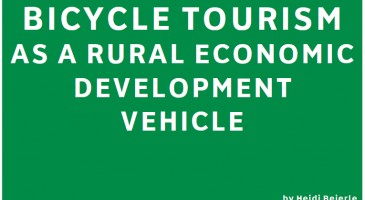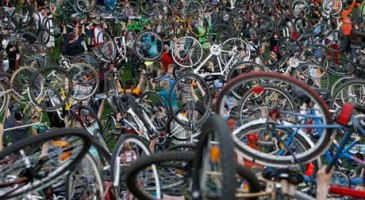I've been commuting to work by bicycle for more than 25 years; endless hours of stop/start riding on grimy roads pockmarked with deadly potholes. Not only is it a battle against the weather, but you're taking your chances with zoned-out pedestrians, aggressive minicabbers and myopic lorry drivers, too. But that was the bad old days. The past few years have seen an explosion of urban cycling and the pastime is now basking in something of a golden moment. And, perhaps inspired by the phenomenal successes of Bradley Wiggins, Victoria Pendleton and Mark Cavendish, the arrival of the Boris Bikes or the realisation that cycling is cheap, quick and eco-friendly, a new generation of fresh-faced "cycos" is saddling up and taking to two wheels. The more of us there are out there, the better for all. It's safety in numbers. So step off that bus, and start pedalling your own trusty steed. The city...
News: May 2012
May
It may have a way to go before it rivals Amsterdam but Plymouth has been named as the UK's most bike-friendly city. Big cycling cities like London and Cambridge, however, languished in towards the bottom of the list. Researchers ranked the cities on a range of criteria, including the numbers bike thefts, accidents, cycle routes and bike-repair centres. Despite the best efforts of the "cycling Mayor", the City of London came out at number 50, with Greater London in 56th, partly fuelled by the prevalence of bicycle theft. And Cambridge, where the wheels very quickly came off an early attempt at a "Boris Bike" system, was even lower in 60th place. Graeme Tones of Virgin Money, which released the research today, said: "Cycling continues to increase in popularity and is a major contributor to improving general health and easing traffic congestion. Government and local councils are doing...
May
Visibility limitations make cycling at night particularly dangerous. We previously reported cyclists' perceptions of their own visibility at night and identified clothing configurations that made them feel visible. In this study we sought to determine whether these self-perceptions reflect actual visibility when wearing these clothing configurations. In a closed-road driving environment, cyclists wore black clothing, a fluorescent vest, a reflective vest, or a reflective vest plus ankle and knee reflectors. Drivers recognised more cyclists wearing the reflective vest plus reflectors (90%) than the reflective vest alone (50%), fluorescent vest (15%) or black clothing (2%). Older drivers recognised the cyclists less often than younger drivers (51% vs 27%). The findings suggest that reflective ankle and knee markings are particularly valuable at night, while fluorescent clothing is not....
May
.Cycling Advocates' Network Winter Appeal (2012)At CAN we're united by our love of cycling and all the benefits it brings: to our health, wallets, well-being, family and friends, community, and our environment.CAN is committed to a broad vision:To promote the benefits of everyday cycling: cost savings, better health, less congestion, cleaner air, reduced reliance on imported fuel, and a better quality of life.More than ever, the tight economic environment opens the door to develop affordable, sustainable, and healthy transport opportunities throughout New Zealand, but this requires the will of the people. As an a-political organisation, CAN is the credible and authoritative voice for the everyday cyclist.With your financial support, CAN is able achieve much more [either] by [joining CAN as a financial member or] becoming a regular donor, or a one-off donation...

May
At the 2011 Oregon Governor's Conference on Tourism an entire workshop session focused on Bicycle Tourism. Oregon has long recognized bicycling - in all forms - as one of the state's great assets. Travel Oregon, the state's organization for planning, developing, and marketing travel to local, regional, domestic, and international visitors, currently markets Oregon cycling across the nation and abroad. The Oregon Bicycle Tourism Partnership, that Travel Oregon convenes, has been a statewide effort since 2003 and includes over 120 collaborating organizations and partners. Because the state supports cycling and promotes great cycling resources and infrastructure, bicycle tourism is one of Travel Oregon's top three priorities for visitor experience marketing. The new research presented here examines the self-contained bicycle traveler and describes nuances of these cyclists' travel...

